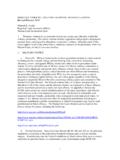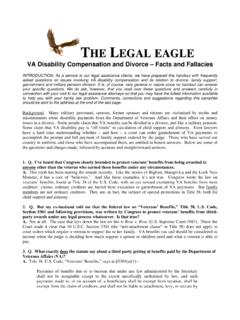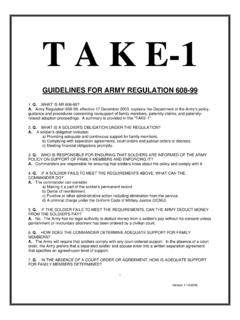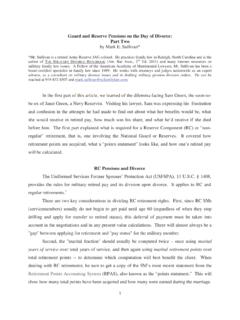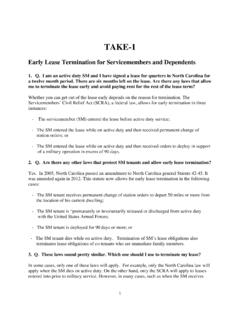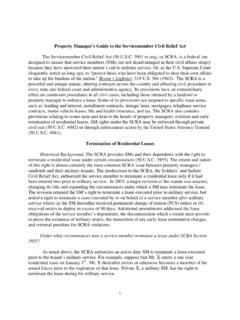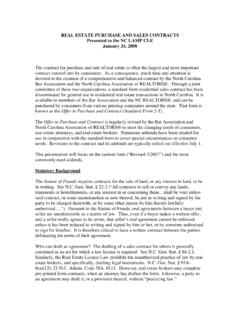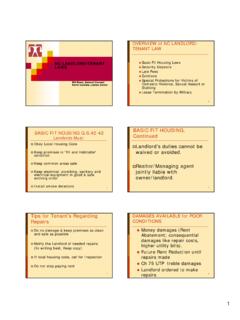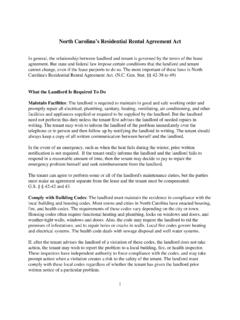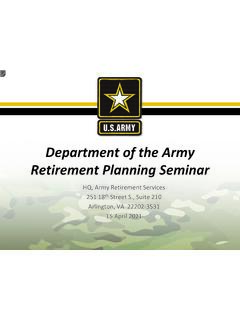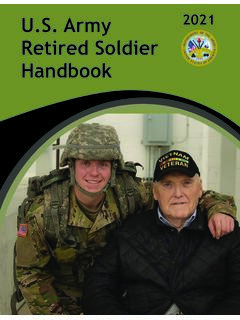Transcription of VA Disability Compensation and Divorce – Facts and Fallacies
1 THE LEGAL EAGLE VA Disability Compensation and Divorce Facts and Fallacies INTRODUCTION: As a service to our legal assistance clients, we have prepared this handout with frequently asked questions on issues involving VA Disability Compensation and its relation to Divorce , family support, garnishment and military pension division. It is, of course, very general in nature since no handout can answer your specific questions. We do ask, however, that you read over these questions and answers carefully in connection with your visit to our legal assistance attorneys so that you may have the fullest information available to help you with your family law problem.
2 Comments, corrections and suggestions regarding this pamphlet should be sent to the address at the end of the last page. Background. Many military personnel, spouses , former spouses and retirees are victimized by myths and misstatements about Disability payments from the Department of Veterans Affairs and their effect on money issues in a Divorce . Some people claim that VA benefits can be divided in a Divorce , just like a military pension. Some claim that VA Disability pay is off limits in calculation of child support and alimony.
3 Even lawyers have a hard time understanding whether and how a court can order garnishment of VA payments to accomplish the prompt and full payment of family support ordered by the judge. Those who have served our country in uniform, and those who have accompanied them, are entitled to honest answers. Below are some of the questions and charges made, followed by accurate and straightforward answers. 1. Q. I ve heard that Congress clearly intended to protect veterans benefits from being awarded to anyone other than the veteran who earned those benefits under any circumstances.
4 A. This myth has been making the rounds recently. Like the stories of Bigfoot, Shangri-La and the Loch Ness Monster, it has a core of believers. And like these examples, it s not true. Congress wrote the law on veterans benefits, found at Title 38 of the Code, with an eye toward exempting VA benefits from most creditors claims; ordinary creditors are barred from execution or garnishment of VA payments. But family members are not ordinary creditors. They are, in fact, the subject of special protections in Title 38, both for child support and alimony.
5 2. Q. But my ex-husband told me that the federal law on Veterans Benefits, Title 38, Code, Section 5301 and following provisions, was written by Congress to protect veterans benefits from third-party awards under any legal process whatsoever. Is that true? A. Not at all. The case that lays down the law on this is Rose v. Rose ( Supreme Court 1987). There the Court made it clear that 10 Section 5301 (the anti-attachment clause in Title 38) does not apply to court orders which require a veteran to support his or her family.
6 VA benefits can and should be considered as income when the judge is deciding how much support a spouse or children need and what a veteran is able to pay. 3. Q. What exactly does the statute say about a third party getting at benefits paid by the Department of Veterans Affairs (VA)? A. Title 38, Code, Veterans Benefits, says at 5301(a)(1) Payments of benefits due or to become due under any law administered by the Secretary shall not be assignable except to the extent specifically authorized by law, and such payments made to, or on account of, a beneficiary shall be exempt from taxation, shall be exempt from the claim of creditors, and shall not be liable to attachment, levy, or seizure by 2or under any legal or equitable process whatever, either before or after receipt by the beneficiary.
7 4. Q. Is there a loophole in the law that allows the judge to consider my ex-husband s VA Disability Compensation as a divisible asset in a Divorce ? A. No. Federal law in particular, the uniformed services Former spouses protection Act, found at 10 1408 exempts VA Disability payments from division upon Divorce . It is not an asset which can be divided at Divorce as marital or community property. 5. Q. I ve heard that state laws do not take precedence over federal law. That means that my VA benefits are immune from any consideration or garnishment in domestic court, right?
8 A. While part of the statement is correct that state laws are subordinate to federal laws the rest of the statement could be called urban legend. It s just not so. In general, all sources of income must be considered by the court in determining support, whether the income is taxable or tax-free, whether the source is wages, rents, royalties, VA benefits, military retired pay, Combat-Related Special Compensation , Social Security Disability payments or even an inheritance from your Uncle Louie! And the provisions of Title 38 make it clear that Congress intended that VA benefits may be considered as a source of income for support purposes.
9 Not only are there graduated benefit schedules, based on how many dependents a veteran has, but there is an apportionment procedure to use when a veteran is not discharging his or her responsibility for support. The apportionment procedures are found at 38 5307. 6. Q. Is VA Compensation tax-exempt? What about military retired pay? Who pays each to the veteran/retiree? A. VA Compensation is tax-exempt, while military retired pay is not. Military retired pay and Combat-Related Special Compensation are paid by the Department of Defense under Title 10, Code, while veterans benefits are paid by the Department of Veterans Affairs under Title 38.
10 7. Q. My husband isn t paying me, and I need to get the court to order a garnishment. Can VA benefits be garnished for child support or alimony? A. Yes, but only if the individual who is receiving VA benefits has waived military retired pay to obtain the VA payments. This is set out in Title 42, Code, Section 659. 8. Q. Can VA benefits be considered as a source of income in awarding child support or alimony? A. Yes, although individual states may have exempted VA Disability benefits. In Rose v. Rose (1987), the Supreme Court reviewed a contempt judgment against a veteran whose sole source of income was his VA Disability Compensation .
